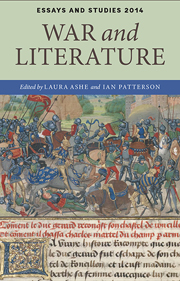Book contents
- Frontmatter
- Contents
- List of Illustrations
- Notes on Contributors
- Preface
- I IDEOLOGIES
- Acts of Vengeance, Acts of Love: Crusading Violence in the Twelfth Century
- Peril, Flight and the Sad Man: Medieval Theories of the Body in Battle
- ‘Is this War?’: British Fictions of Emergency in the Hot Cold War
- II INTERPRETATIONS
- III AFTERMATHS
- Index
‘Is this War?’: British Fictions of Emergency in the Hot Cold War
from I - IDEOLOGIES
Published online by Cambridge University Press: 05 October 2014
- Frontmatter
- Contents
- List of Illustrations
- Notes on Contributors
- Preface
- I IDEOLOGIES
- Acts of Vengeance, Acts of Love: Crusading Violence in the Twelfth Century
- Peril, Flight and the Sad Man: Medieval Theories of the Body in Battle
- ‘Is this War?’: British Fictions of Emergency in the Hot Cold War
- II INTERPRETATIONS
- III AFTERMATHS
- Index
Summary
‘But is there a war on, sir, or what?’
The officer stared at him curiously, as though doubting the evidence of his own ears.
‘A war?’ he chuckled at last, as though the word had amused him. ‘I'm afraid you're rather simplifying the issue, aren't you? The conception of war, you know, is rather an old-fashioned one, don't you agree? There's surely not much distinction nowadays between being at war and being at peace.’
Most writing about British Cold War culture has concentrated on nuclearism, pacifism, decolonisation, socialism, postmodernism, Americanisation – in short, on everything but war. One effect of the attention paid to these various narratives has been to obscure the fact that citizens of the USSR and those of Western capitalist democracies alike understood and feared the Cold War as war, even if later accounts have tended to lose sight of what Holger Nehring has called the ‘warlike character’ of their experiences. If the Cold War is to have any explanatory force as a context for literary works beyond serving as a useful periodising shorthand, then we need to know in what sense, if any, the literature of the Cold War era understood itself as a war literature. ‘What kind of war was this?’ asks the historian Anders Stephanson. ‘The two sides never went to war with each other. There is no obvious beginning, no single moment of initial aggression, no declaration of war, no crossing of a certain line, and no open military engagement.
- Type
- Chapter
- Information
- War and Literature , pp. 41 - 58Publisher: Boydell & BrewerPrint publication year: 2014



